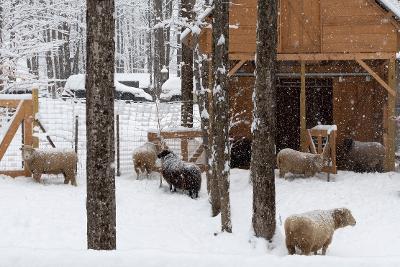The wrapping paper has been rolled and stored, the gifts carefully stuffed into created corners and the last of the holiday leftovers eaten. We spend New Year’s day pulling down the shooting star off the shop, burning boxes, and feeding wreaths and trees, stripped of ribbons, to our sheep and curious chickens. There is a new nakedness to the house, like a face without makeup: a utilitarian air about it all that says back to business. Without the daily work of twisting on window candles and plugging in Christmas lights, there is stillness that descends at four o’clock. Winter arrives.
One of the things I like about winter is dressing for the cold. In the summer I think about what goes with what and choose footwear accordingly. In these months I dress for function. I pull on layers, with cotton tee shirt against my bare skin, heavy wool as the outer layer. My hat is tugged down over a careless braid and as far over my ears as possible. I have a pair of hand-knit wool socks that retain the shape of a foot at all times, several shades of brown yarn and slightly too big. I’ve taken to wearing them every day, washing them in cold water and hanging them by the wood stove each evening. I like the padding and warmth they provide, funky and clunky.
My barn coat has seen better days, the cuffs tattered from catching on water buckets. When I first got it, I washed it weekly to erase the barn smell from it and keep it looking decent. I’ve long since given that up and it hangs over the wood box, like an old friend, waiting for me to take it out. I’ve come to enjoy the smell: it reminds me what it is for.
We spend every morning and evening tending animals: each of us silently going about our chores. I muck the two chicken coops, scrape the roosts with a metal dust pan and empty it into my green plastic bucket balanced over the feeders. Hens come and go, visiting with me each morning, standing on the roost, angling their head to the side, wondering what I’m doing, even though they see me do it every single day. If they get in my way I give them a bit of a scoot forward and they squawk, indignant. I enjoy breaking great chunks of shavings off the tight square bale wrapped in yellow plastic, spreading it on the roosts and sprinkling it over the floor. I check feeders and make sure both coops have clean water and that the heater is plugged in. From the window of the back coop I can see Paul pitchforking heavy layers of wet bedding onto the great pile of manure in the corner of the winter paddock.
I pull the wooden barn door, enjoying the groan as it opens. I’m greeted by the youngest Gotland wether, Quince. I scratch behind his ears: he closes his eyes as I move under his chin. I stand in the open doorway to the paddock and watch everyone eat. An important part of it all is simply observing. After years of watching the same animals, you pick up small details; a slight limp, too much scratching, isolating. Eyes on the flock. If Paul isn’t finished, I lift flakes of fresh hay from the shelf and fill the feeders. I can see pressed clover and green grass in it, it smells sweet in my hands. Again checking the tubs for clean water, I take our sieve off the hook and scoop out wet hay and leaves. The water tub sports a rim of snow and ice, like salt around a Margarita. Vapor rises from the heated water.
Every day, every night is the same and yet. remarkably, we never tire of it. Each night we burrow under the wool blanket that these animals have provided. We crack open an egg, the yolk so deep yellow it almost hurts our eyes, lay it over toast and feed ourselves. Our freezer is filled with the colorful red berries, bright green kale, beans and peas we have grown. There is a simplicity and a wisdom at the same time.
On our land across the dirt road we can see remnants of sheep fence running, like a jagged scar through the trees, sections becoming part of the tree itself. There was a time when the hillside was cleared of forest and it was grazing land for sheep. Sometimes in the dark of night, I stand and look up toward that mountain, I feel the breath of the shepherds before me, cold and hard off the mountain, blowing right through me, reminding me of where I come from.
The world feels confused, like it is running faster than it is capable of and that it will, ultimately trip. There is an idea that the things that lessen our work, our purpose, will help us all find the true happiness we search for, when in fact it is this very work, finding our individual purpose, that gives us deep contentment.
Farming, growing our food, raising animals is, as Brad Kessler writes in his beautiful book, Goat Song, “a door into an older way of being.”
“Of all the paths you take in life, make sure a few of them are dirt.”
John Muir
